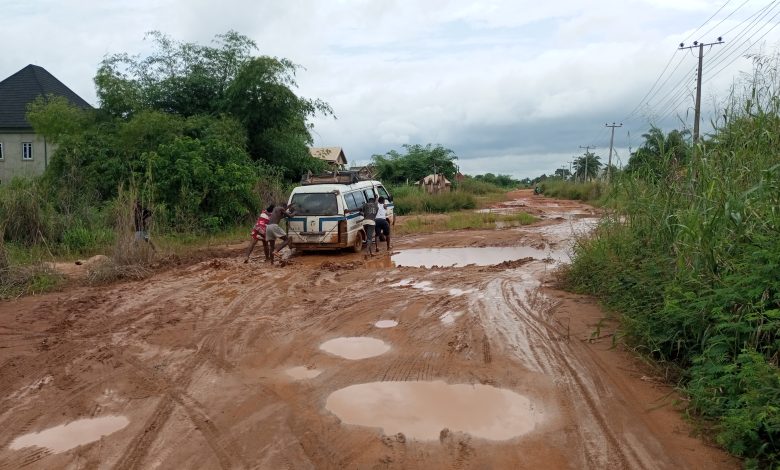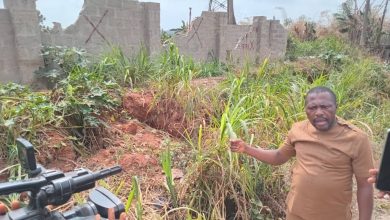INVESTIGATION: After gulping N3.4bn, FG re-awards Otuocha-Abaji road project to same contractor at N34bn
Investigation

~ Deplorable road condition hinders movements of farm produce, others- residents
~ Analysts describe governments action as wasteful, unconstitutional
~ Project not abandoned, to continue with new design- Contractor
By Alfred Ajayi
“Last week, I carried somebody to Umueze-Anam and on our way, we met some people carrying a corpse. When they came to the end of the tarred road, they came down from their cars and carried the casket on their heads and trekked to Umuenwelum Anam,” said Ogbonna Onwe, a commercial motorcyclist, describing the adverse effect of the deplorable condition of the Otuocha-Nzam-Inoma-Iheaka-Abaji road in Anambra West Local Government Area of Anambra State.
That encounter, and other experiences justified the motorcyclist’s initial hesitation to ferry this reporter and a fixer on an assessment tour of the road. “If not that I see chief with you, I cannot put my bike on this road,” he said, acknowledging the fixer.
The Otuocha-Nzam-Inoma-Iheaka-Abaji road is a 30-kilometre road that was awarded on December 3, 2009 by the administration of then President Umaru Musa Yar’adua. Residents of the LGA had then described it as a Christmas gift and were jubilant that the Federal Government had decided address their greatest worry.
Awarded to Niger Construction Limited at the initial cost of N5,804,811,747.04, the completion period for the project was put as 24 months. The project had raised the hope of residents that their local government headquarters, Nzam, would soon measure up to others.
“Our people were very happy because we have stayed for many years without access road. We were in the dark, cut off from other parts of the state,” Dr Mike Ozoemena, a resident of Umudora Anam, a community in the LGA remarked.
“So, with the project awarded, we were hoping that one day, we would be connected to other parts of the state,” he said.
But not long after work commenced, their joy was cut short as the project was stopped. “Our hope was cut short and our problems got compounded. We continued with the Israelites kind of journey to Awka or Onitsha before heading to Abaji. So, a journey of one and half hour now takes about 5hrs or more,” Mathias Ameke, a resident of Mmiata Anam, another community in the LGA, recalled.
Apart from its huge economic potential for Anambra State, residents say the road, when completed is capable easing the evacuation of farm produce from the benefiting communities.
How poor state of road affect communities
After the long and torturous journey that lasted more than 30 minutes, a welcoming signpost ushered this reporter and a fixer to Oromaetiti Anam; a beautiful and serene community in Anambra West LGA. But as earlier threatened, the motorcyclist ended the trip abruptly at the boundary between Oromaetiti and Umuenwelum Anam marked by a small flowing Ora-oroma River, where residents were seen taking their bath, washing clothes, as children splash the water while others washed their motorcycles.
At the riverside, Okwuota Ifediora, a septuagenarian spoke of the hardship of evacuating farm produce due to the condition of the road. “See my children there suffering to cross the yams. After suffering to plant, you hardly see buyers,” she lamented.
Farmers like Ifediora attest that the deplorable condition of the Otuocha-Abaji road and others, traversing agricultural belts across the country threatens food security.
The case is worsened by lack of storage facilities in the area, explained Ifediora, adding that “We eat the much we can and the rest get rotten or we sell often at giveaway prices. For those who try to evacuate their harvested crops to nearby markets, they do so at a higher cost and at the end, there is little or no gain.”
The septuagenarian narrated how the deplorable state of the road affects access to health care services stressing that many pregnant women and sick persons have lost their lives while being carried out of Oromaetiti for medical care.
“Our primary health care centre is not functioning well. Sick people and pregnant women prefer to go to chemist shops. The greatest desire of our people is having this road constructed by the Federal Government,” she noted.
With vehicles constantly breaking down on the road, Ifeoma Kingsley, another female farmer said they have nothing tangible to justify the labor associated with subsistence farming. “Farming here is suffering from tilling, ridge making, planting and weeding. At the end you harvest but no road to evacuate. We sell at giveaway prices,” she said.
Based on this, Dr Mike Ozoemena urged President Bola Tinubu’s administration to construct rural roads for easy evacuation of farm food produce.
N3.4billion already spent
Apart from other releases to the contractor in the early days of the project, data from the Govspend portal hosted by the BudgIT Foundation, a machine-readable replica of the Federal Government’s Open Treasury portal, revealed that N316,666,666.66 was paid to the contractor on October 2, 2018. The contractor received another ₦148,452,119.92 on January 14, 2019 while ₦26,197,432.92 was paid on 9th May, 2019. Cumulatively, records from the Federal Ministry of Works shows the contractor had received a total of N3,433,445,808.05, which is more than half of the initial project cost.
“I don’t know why government would decide to award a contract, start the project and then abandon it. If government was not ready to do this road, why start it?” asked Samuel Jemigbola, a former President-General of Ukwualla community in Anambra West LGA.
At the starting point of the project, this reporter was greeted by obvious deterioration, forcing repeated refusals by several commercial motorcyclists (popularly called okada) to take him on an assessment tour of the area.
The Commercial Manager of Niger Construction Limited, Julien Shahinen, told this reporter that they were able achieve first binder asphalting of 7km out of the 30km road before the project stopped. However, residents in the LGA regretted that the asphalted part of the 7km said to have been achieved by the contractor started failing less than one year after construction. It was observed that the road shoulder is being eaten up by consistent flooding.
This reporter observed that from the terminating point of the asphalted portion of the road lies the nightmare for road users. With the rains at their peak, it was observed that the road was waterlogged, making movement difficult for even pedestrians.
The project to construct the Otuocha-Nzam-Inoma-Iheaka-Abaji road was awarded to Niger Construction Limited, a subsidiary of the C.A.T Group, covering various sectors such as oil and gas, energy, utilities, civil, infrastructure and buildings, was registered in Nigeria on November 2, 1961 with registration number 2760. Corporate Affairs Commission, CAC search showed that the company is run by a seven-man board of directors. They are: Alsayegh Roger Gerges (Lebanese), Col Iheanocho Lambert Ogbonna (Nigerian), Sir Odhegolo Henry Orioko (Nigerian), Dr AnthoinePapadopoulo (Lebanese), Dr Aziz Michel Bassoul (Lebanese), Hanna Georges Miled (Lebanese), Omeru Mike (HRM) (Nigerian).
Its shareholders are C.A.T. International Limited, Ministry of Finance Incorporated, Imo State, Niger Construction Limited Employees Trust Fund, and Ministry of Finance Incorporated, Delta State. The Company Secretary is Marina Nominees.
NIGERCAT is in breach of Section 822 (1) of the Companies and Allied Matters Act (CAMA 2020), which compels every registered business name, private or public company (limited by shares or guarantee or unlimited), incorporated trustees, or partnership to file annual returns with the Corporate Affairs Commission (CAC) latest by 30th June every year. As at October 22, 2023, NIGERCAT had not complied with the above provision for 2022, hence its status is inactive on the CAC portal.
Its Commercial Manager, Shahinen in reaction said, “We don’t have a problem with this. Since 1962 we started operation in Nigeria, we never broke the law. You know sometimes, when you do some things, it does not get reflected immediately. We are compliant.”
Project re-awarded despite gulping over N3bn
This reporter gathered that despite the initial release of N3,433,445,808.05, which is more than half of the contract award of N5,804,811,747.04, to the contractor, the Otuocha-Nzam-Inoma-Iheaka-Abaji road project has been re-awarded to the same contractor at a reviewed sum of N34,263,364,000,60 with a new design.
“The project was not abandoned but put on hold until the Federal Ministry of Works completes the new design to protect the road from future floods,” Shahine further explained.
“Due to the dam flushing in Cameroun in 2017, the entire area surrounding the project was flooded and the road was submerged by water because the original design did not take this fact into consideration,” he said.
The Zonal Director in charge of South East states in the Federal Ministry of Works, Mr Bede Obioha, threw more light.
“The road was designed prior to that flooding which had devastating effects on the project. This has led to a redesign, introducing a total of five additional bridges to create channels for water to move across the road with minimal damage to the road infrastructure,” the Zonal Director said.
It was gathered that with a new design, the old design and initial resources expended by government to achieve it becomes a waste.
A lawyer and Public Affairs commentator based in Awka, Anambra State, Okoli Akirika, argued that “If the road is abandoned because the terrain is flood prone, government failed in its fundamental duty as contained in the Due Process Act which stipulates that before the government goes into contracts, certain conditions ought to be observed. For that type of critical project, government should have carried out a feasibility study to ascertain the nature and topography of the area,” he said.
Akirika said government does not deploy its scarce resources to the benefit of the common man and added that excuses of flood plain and redesign will not justify its failure to ensure that the road is constructed for the overall benefit of Nigerians.
When confronted with the issue of feasibility study, NIGERCAT’s Commercial Manager expressed discomfort that the reporter was asking for too much. “My friend, you are asking too much details which are internal,” he replied. But, with a reply that the queries were all in a bid to maintain fairness, he answered in the affirmative, “Yes, for sure, we always conduct feasibility studies which is part of the tender.”
This calls to question the credibility and reliability of the feasibility study since it did not take into account that the area is prone to flooding.
But the Zonal Director in charge of South East states in the Federal Ministry of Works, Mr Bede Obioha, pointed that the new contract sum will cater for additional works and other incidentals to address the unusual circumstances. “Due to so many indices in the nation’s economy of recent, there have been market increases in the prices of goods and services and the construction industry is no exception,” he said.
According to NIGERCAT’s Commercial Manager, the contract re-award is a continuation of the previous one. “It is the same augmentation but change in design. NigerCat is currently monitoring the water level to drop down in order to start their activities, as the entire area is waterlogged,” Shahine said.
Government’s actions breach of constitution, wasteful – Analysts
Barrister Okoli Akirika, argued that abandoning projects embarked upon by government at any level violates the socio-economic rights of the affected persons as enshrined in Chapter 2 of the 1999 Constitution. He said this is part of the fundamental objectives and directive principle of state policy, which dictates how government affairs shall be carried out in all aspects – politically, socially, economically, religiously and otherwise.
“By that provision, government should manage its affairs which include contracts to ensure that there are economic benefits derivable from them and government activities should be carried out in such a manner as to avoid waste.
“So, if the government goes into a contract, pays money and it fails to complete it because of corruption, incompetence, ineptitude or whatsoever, it is breaching the constitution,” Akirika argued.
Vahyala Kwaga, a policy analyst with BudgIT explained that abandonment of capital projects is viewed as a proof of misplaced priorities with devastating consequences on the nation’s economy.
Kwaga argued that provision and maintenance of road infrastructure is key to economic and export growth, and increase in per capita income even as it fast tracks the achievement of Sustainable Development Goals SDG of zero hunger and eradication of extreme poverty.
“Unfortunately, the Senate has recorded that the country loses over N1trillion in a year in revenue, due to bad roads. The Federal Road Management Agency (FERMA) also claims that over N1.2 trillion is lost in man hours, per annum, due to the traffic that comes along with poor roads.
“This is in addition to the annual losses from vehicle maintenance that have been estimated to be N133.8 billion per annum,” he regretted noting that the Federal Government has continued to spend huge sums on recurrent expenditure not minding its inability to deliver on-going capital projects as in the case of Otuocha-Abaji road.
He blamed both the executive and legislature for failure to fund awarded contracts. “The Executive through the Ministry of National Planning and the Budget Office is not penalized for failing to complete critical infrastructure projects.”
“The failure of the Legislature stems from their own inability to execute proper oversight because there is no incentive for them to do so. Monies are wasted that could have been used for serious developmental projects and frittered away, representing a net loss to the country,” Kwaga submitted.
Another public policy analyst, Kachi Chukwu explained that the complexities surrounding the abandonment of projects are multifaceted. “A typical example could be inter-ministerial disputes maybe between a ministry of finance and another entity often leading to delayed fund disbursement and the subsequent inability to utilize allocated funds within the fiscal year.
“Another factor relates to governments initiating projects that were neither originally budgeted for nor meticulously planned. This practice necessitates reallocating resources from other agencies, leading to significant variances between planned and actual expenditures at the end of the fiscal year.
Mitigating project abandonment, Chukwu noted, calls for a comprehensive audit and transparency, transparent budgeting, utilization of Open Contracting Data Standards (OCDS), e-procurement systems and citizens’ engagement.
A ray of hope
Disappointed as they are, re-awarding the road is heart-warming for the people of the affected communities. One of them, Samuel Jemigbola, is optimistic that the hitherto elusive relief has come.
NIGERCAT says it awaits clear instructions from the Federal Ministry regarding the specific type of pavement for the project as well as provision of funds. The Federal Government, according to the Zonal Director, is sourcing for funds to complete the project alongside other ongoing federal highway projects in the country.
“There are known mechanism within the contract that may be able to sustain the project to some limits. It is hoped that these limits will not be exceeding and the project will be realized in due course as funds allow,” the Director in charge of South East states assured.
But, Kachi Chukwu, the public policy analyst charged President Bola Tinubu’s administration to reverse the wasteful culture of project abandonment. “Governmental bodies must place a heightened emphasis on meticulous planning and budgeting. Contracts should only be awarded if they were originally part of the planned and budgeted projects, barring unforeseen circumstances like a pandemic, such as the COVID-19 outbreak or natural disasters,” he concluded.
As residents of Anambra West and the entire state earnestly await NIGERCAT back on site, their greatest wish is uninterrupted execution of the project. However, they will also have to pray that funds are available to the Federal Government to deliver the project so dear to their heart.
This story is published under the GovSpend Media Fellowship, supported by BudgIT, ICIR and MacArthur Foundation




